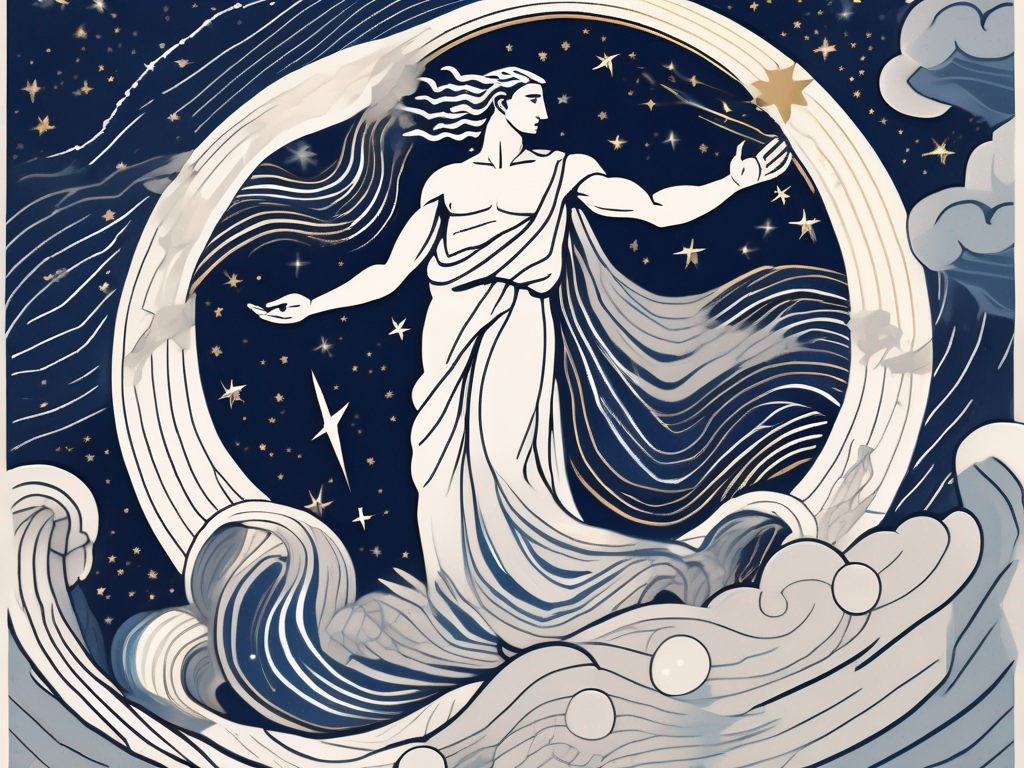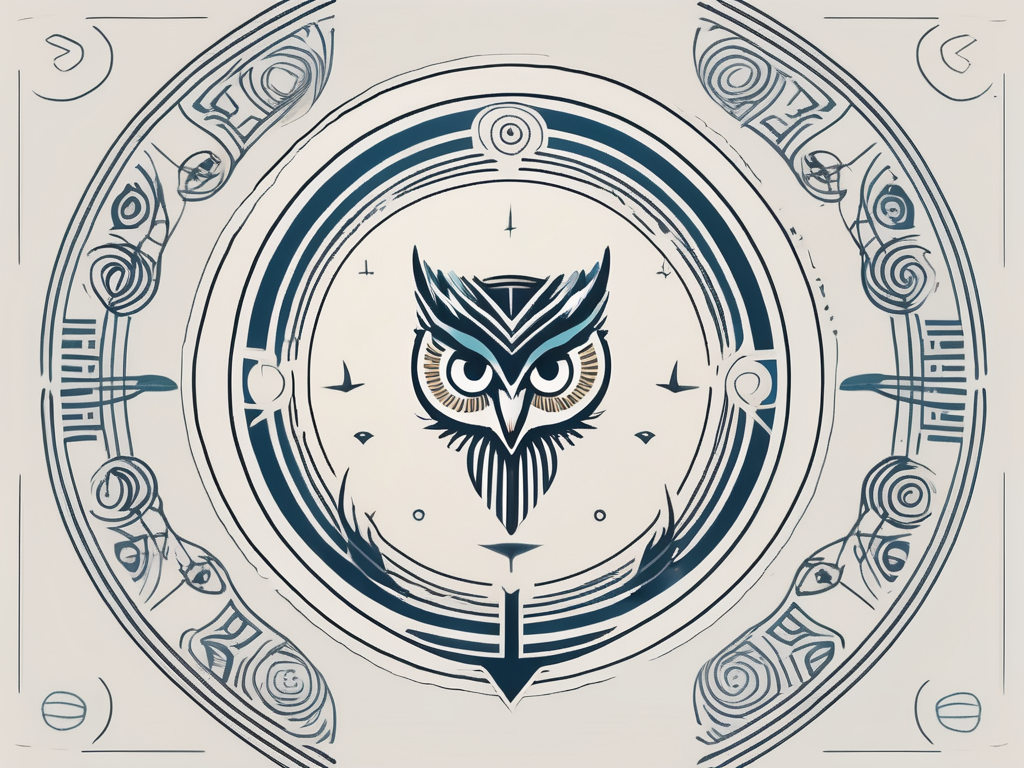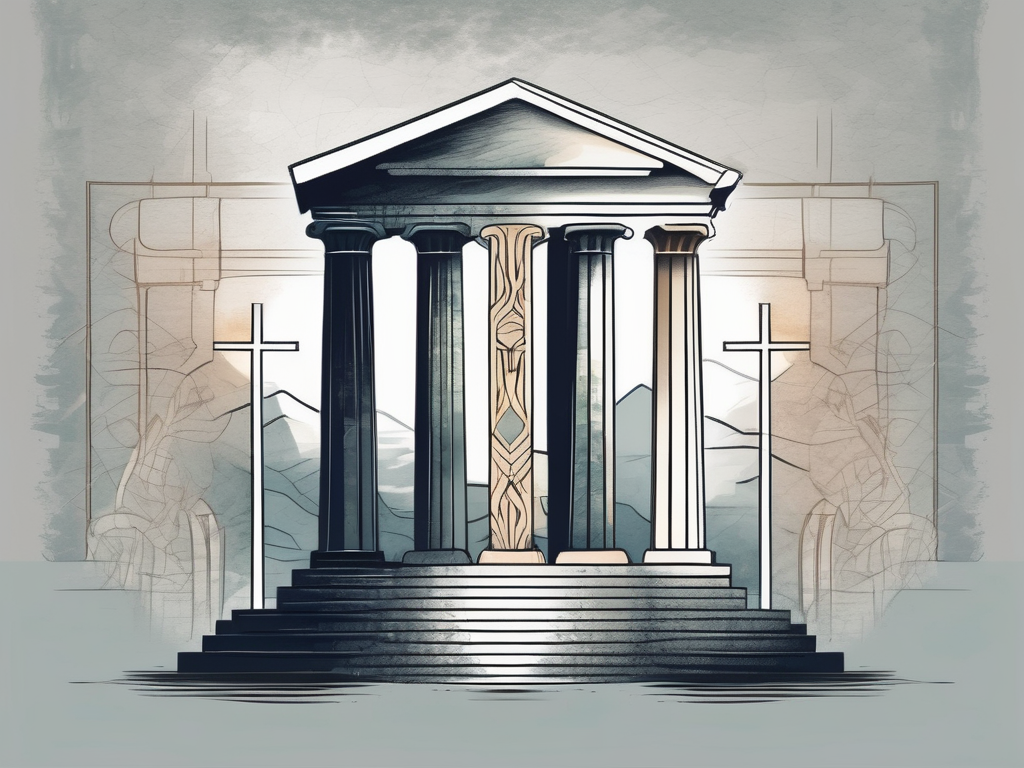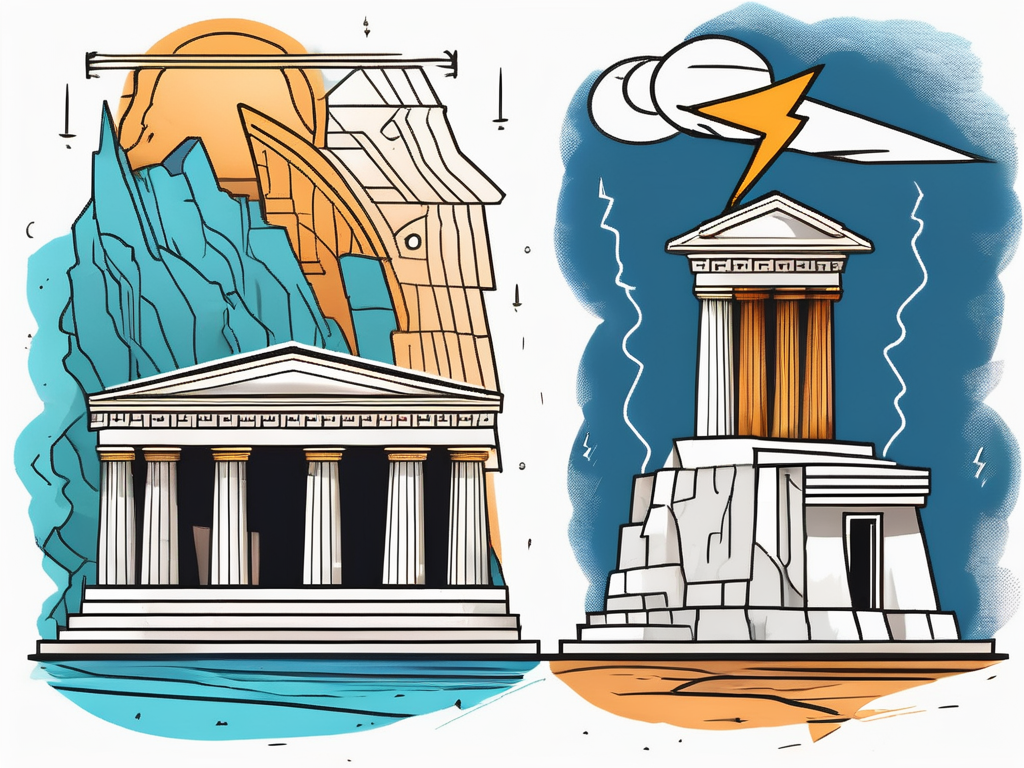In Greek mythology, gods and goddesses hold immense power and influence over the world and its inhabitants. One such deity is Perses, the Greek god of destruction. Understanding Perses and his role in ancient Greek society allows us to delve into the depths of his mythical power and explore the lasting impact he had on Greek culture.
Understanding Perses: The Greek God of Destruction
At the heart of Greek mythology lies a pantheon of gods and goddesses, each with their own unique characteristics and responsibilities. Among them is Perses, a figure embodying destruction and change. To fully comprehend the mythical power of Perses, we must first explore his origins in Greek mythology and the role he played in Greek society.
The Origins of Perses in Greek Mythology
According to ancient Greek texts, Perses was born to the titan siblings, Crius and Eurybia. As the younger brother of Astraeus and Pallas, Perses became known for his destructive nature and ability to bring about chaos. His name itself translates to “to possess” or “to destroy,” reflecting his influential role in the ancient Greek world.
Legend has it that Perses inherited his destructive powers from his father, Crius, who was also associated with the forces of destruction. Crius was known as the titan of heavenly constellations and was believed to have the ability to unleash devastating storms and natural disasters. It is said that Perses inherited this immense power, making him a force to be reckoned with.
As a child, Perses was known for his mischievous nature. He would often play pranks on the other gods and goddesses, causing chaos wherever he went. This behavior earned him a reputation as a troublemaker among the divine beings, but it also showcased his innate ability to bring about change and destruction.
The Role and Responsibilities of Perses
Perses held a significant place in Greek mythology, representing destruction and change. As the embodiment of these forces, he was often called upon to restore balance and initiate transformations. Whether it was the breaking down of old structures or the creation of new ones, Perses’ role was essential in maintaining the cosmic order.
One of Perses’ most notable responsibilities was to oversee the destruction of cities and civilizations that had become corrupt or stagnant. It was believed that through destruction, Perses would pave the way for new beginnings and growth. This concept of destruction as a catalyst for renewal was deeply ingrained in Greek society, as they understood the cyclical nature of life and the need for change.
It is important to note that Perses’ destructive powers were not purely malevolent. In Greek mythology, destruction was seen as an integral part of the cycle of life. Just as a forest needs a fire to rejuvenate its growth, Perses’ actions were necessary for progress and renewal.
Moreover, Perses was also associated with the concept of change on a personal level. It was believed that those who sought transformation or desired to break free from their current circumstances could call upon Perses for assistance. Whether it was a mortal seeking a new path in life or a god in need of a fresh start, Perses was seen as a guiding force in facilitating personal growth and evolution.
In conclusion, Perses, the Greek god of destruction, played a crucial role in Greek mythology and society. His origins as the son of Crius and Eurybia, along with his mischievous nature, shaped his reputation as a powerful force of chaos. However, his responsibilities extended beyond mere destruction, as he was also seen as a catalyst for change and renewal. Understanding Perses’ role in Greek mythology provides us with valuable insights into the ancient Greek worldview and their beliefs regarding the cyclical nature of life.
The Symbolism of Perses in Ancient Greece
Beyond his role in Greek mythology, Perses held symbolic significance in the hearts and minds of the ancient Greeks. The very mention of his name evoked both fear and awe, representing not only destruction but also the power of transformation.
Legend has it that Perses, the son of the Titan Crius and the Oceanid Eurybia, possessed an innate ability to bring about destruction. His fiery nature and immense power made him a force to be reckoned with. The ancient Greeks believed that destruction was not merely a negative force, but rather an essential aspect of growth and evolution. Just as a forest fire clears away the old and makes way for new growth, Perses symbolized the transformative power of destruction.
Perses as a Symbol of Destruction and Change
Throughout history, destruction has often been associated with negative connotations. However, in ancient Greek culture, the importance of destruction and change was recognized as essential for growth and evolution. Perses, with his fiery nature, embodied these transformative forces, making him a symbol of both fear and reverence.
It was believed that Perses had the ability to bring about cataclysmic events, such as earthquakes and volcanic eruptions. These destructive forces were seen as necessary for the renewal of the natural world. The ancient Greeks understood that without destruction, there could be no creation. They saw Perses as a catalyst for change, a necessary agent in the cycle of life.
The Influence of Perses on Greek Society and Culture
The influence of Perses permeated various aspects of Greek society and culture. His mythical power and symbolism can be observed in numerous ancient texts, art forms, and religious practices. The echoes of Perses’ destructive nature and transformative influence are still felt today.
Ancient Greek literature is replete with references to Perses and his role in shaping the world. In epic poems such as the Iliad and the Odyssey, Perses is often depicted as a formidable force, wreaking havoc and bringing about change. His presence serves as a reminder of the delicate balance between destruction and creation.
In art, Perses is often portrayed as a towering figure, wreathed in flames and surrounded by chaos. These depictions capture the awe-inspiring power of destruction and the potential for rebirth that it holds. Sculptures and paintings of Perses adorned temples and public spaces, serving as a constant reminder of the transformative forces at play in the world.
Religious practices in ancient Greece also incorporated Perses’ symbolism. Rituals and ceremonies were performed to honor and appease him, recognizing the necessity of destruction in the grand scheme of things. The ancient Greeks understood that without the power of Perses, the world would stagnate and growth would be impossible.
Even today, the symbolism of Perses continues to resonate. In a world that is constantly changing, his role as a symbol of destruction and transformation serves as a reminder of the cyclical nature of life. Just as the ancient Greeks recognized the importance of destruction for growth, we too can learn from Perses and embrace the transformative power of change.
The Power and Abilities of Perses
What set Perses apart from other Greek gods was his specific set of powers and abilities. These gifts granted him the ability to carry out his role as the god of destruction and change with great efficiency.
The Destructive Powers of Perses
Perses possessed immense destructive powers, capable of reducing cities to rubble and mountains to dust. With a single wave of his hand, he could unleash chaos and upheaval. This destructive force, although feared by mortals, was a necessary aspect of the cosmic order recognized by the ancient Greeks.
When Perses unleashed his destructive powers, the earth trembled beneath his feet. The sheer magnitude of his strength was awe-inspiring, as he effortlessly demolished anything in his path. The thunderous sound of crumbling structures echoed through the air, leaving a trail of devastation in his wake.
Legends tell of Perses’ encounter with a fortified city that dared to defy the gods. With a mighty roar, he summoned a tempest of fire and brimstone, obliterating the city walls and reducing it to mere ashes. The once bustling streets were now nothing more than a desolate wasteland, a testament to the overwhelming power of Perses.
Perses’ Role in the Cosmic Order
Perses played a crucial role in maintaining the cosmic order of the Greek pantheon. By breaking down and reshaping the world, he ensured that the balance between creation and destruction remained intact. His actions were not random acts of violence but rather part of a grand design envisioned by the gods.
As the god of change, Perses was responsible for the ebb and flow of the universe. He would bring about destruction to make way for new beginnings, tearing down the old to pave the way for the new. In this cyclical process, Perses ensured that life continued to evolve and progress, never stagnating in a state of complacency.
It is said that Perses possessed the ability to see into the future, foreseeing the consequences of his actions. He understood that destruction was not an end in itself but a means to an end, a necessary step towards renewal and growth. With this foresight, he carefully orchestrated his destructive endeavors, ensuring that they served a greater purpose in the grand tapestry of the cosmos.
Through his role in the cosmic order, Perses embodied the inherent duality of existence. He represented both the destructive force that could bring about devastation and the catalyst for change that could lead to progress. Without Perses’ powers and abilities, the delicate balance of the Greek pantheon would be disrupted, and the world would be trapped in a perpetual state of stagnation.
The Legacy of Perses in Modern Culture
Although the ancient Greeks may have worshipped Perses, his influence did not cease with the decline of their civilization. Even in modern times, Perses continues to exert his mythical power through various forms of art and literature.
References to Perses in Literature and Art
The legacy of Perses can be found in numerous literary works that draw inspiration from Greek mythology. From epic poems to contemporary novels, authors have harnessed the power of Perses’ destruction and transformation, weaving it into captivating stories that resonate with readers.
The Modern Interpretation of Perses’ Mythology
As our understanding of the ancient world evolves, so does our interpretation of Perses’ mythology. Scholars and artists continue to explore and reinterpret his role in Greek society, delving deeper into the complexities of his character and influence. This ongoing exploration highlights the timelessness of Perses’ mythical power.
In conclusion, the mythical power of Perses, the Greek god of destruction, extended far beyond the ancient pantheon. From his origins in Greek mythology to his role in society, Perses represented both destruction and change. His influence shaped ancient Greek culture and continues to captivate modern minds. Through his symbolic significance and immense power, Perses reminds us of the transformative forces at play in our world and the necessity of destruction for renewal.












